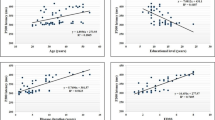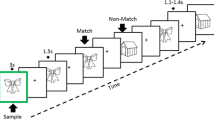Abstract
P300 event-related potential component may sensitively predict mild cognitive impairment (MCI) progression. Here, pooled effect size estimates of P300 amplitude and latency were computed at midline electrodes among controls, MCI patients, and Alzheimer’s disease (AD) patients. Baseline data were compared to one-year follow-up data. MCI patients showed decreased P300 amplitude and prolonged latency compared to controls. Pooled standardized mean differences (SMDs) were −0.67 (95 % CI −1.12 to −0.23, P = 0.003) and 0.90 (95 % CI 0.66–1.14, P < 0.00001), respectively. P300 latency decreased in MCI compared to AD patients where the pooled SMD was −0.52 (95 % CI −0.85 to −0.18, P = 0.003). Amplitude and latency differed between MCI baseline and follow-up. Pooled SMDs were 0.47 (95 % CI 0.29 to −0.65, P < 0.00001) and −0.52 (95 % CI −0.71 to −0.34, P < 0.00001), respectively. Group differences in MCI P300 latency existed compared to control and AD patients. P300 latency may therefore be a sensitive indicator for early cognitive decline or disease progression in MCI patients and identifying elderly patient progression to MCI and/or AD.





Similar content being viewed by others
References
Chertkow H (2002) Mild cognitive impairment. Curr Opin Neurol 15(4):401–407
Petersen RC, Roberts RO, Knopman DS, Boeve BF, Geda YE, Ivnik RJ, Smith GE, Jack CR Jr (2009) Mild cognitive impairment: ten years later. Arch Neurol 66(12):1447–1455. doi:10.1001/archneurol.2009.266
Petersen RC, Smith GE, Waring SC, Ivnik RJ, Tangalos EG, Kokmen E (1999) Mild cognitive impairment: clinical characterization and outcome. Arch Neurol 56(3):303–308
Petersen RC, Doody R, Kurz A, Mohs RC, Morris JC, Rabins PV, Ritchie K, Rossor M, Thal L, Winblad B (2001) Current concepts in mild cognitive impairment. Arch Neurol 58(12):1985–1992
Jack CR Jr, Shiung MM, Weigand SD, O’Brien PC, Gunter JL, Boeve BF, Knopman DS, Smith GE, Ivnik RJ, Tangalos EG, Petersen RC (2005) Brain atrophy rates predict subsequent clinical conversion in normal elderly and amnestic MCI. Neurology 65(8):1227–1231. doi:10.1212/01.wnl.0000180958.22678.91
Schmidtke K, Hermeneit S (2008) High rate of conversion to Alzheimer’s disease in a cohort of amnestic MCI patients. Int Psychogeriatr 20(1):96–108. doi:10.1017/s1041610207005509
Tuokko H, Frerichs R, Graham J, Rockwood K, Kristjansson B, Fisk J, Bergman H, Kozma A, McDowell I (2003) Five-year follow-up of cognitive impairment with no dementia. Arch Neurol 60(4):577–582. doi:10.1001/archneur.60.4.577
Eschweiler GW, Leyhe T, Kloppel S, Hull M (2010) New developments in the diagnosis of dementia. Dtsch Arztebl Int 107(39):677–683. doi:10.3238/arztebl.2010.0677
Christa Maree Stephan B, Minett T, Pagett E, Siervo M, Brayne C, McKeith IG (2013) Diagnosing mild cognitive impairment (MCI) in clinical trials: a systematic review. BMJ Open. doi:10.1136/bmjopen-2012-001909
Campanella S (2013) Why it is time to develop the use of cognitive event-related potentials in the treatment of psychiatric diseases. Neuropsychiatr Dis Treat 9:1835–1845. doi:10.2147/ndt.s53687
Bennys K, Rondouin G, Benattar E, Gabelle A, Touchon J (2011) Can event-related potential predict the progression of mild cognitive impairment? J Clin Neurophysiol 28(6):625–632. doi:10.1097/WNP.0b013e31823cc2d3
Sutton S, Braren M, Zubin J, John ER (1965) Evoked-potential correlates of stimulus uncertainty. Science 150(3700):1187–1188
Picton TW (1992) The P300 wave of the human event-related potential. J Clin Neurophysiol 9(4):456–479
Donchin E (1987) The P300 as a metric for mental workload. Electroencephalogr Clin Neurophysiol Suppl 39:338–343
Pedroso RV, Fraga FJ, Corazza DI, Andreatto CA, Coelho FG, Costa JL, Santos-Galduroz RF (2012) P300 latency and amplitude in Alzheimer’s disease: a systematic review. Br J Otorhinolaryngol 78(4):126–132
Howe AS, Bani-Fatemi A, De Luca V (2014) The clinical utility of the auditory P300 latency subcomponent event-related potential in preclinical diagnosis of patients with mild cognitive impairment and Alzheimer’s disease. Brain Cogn 86:64–74. doi:10.1016/j.bandc.2014.01.015
Polich J, Corey-Bloom J (2005) Alzheimer’s disease and P300: review and evaluation of task and modality. Curr Alzheimer Res 2(5):515–525
Liu S, Zhang L, Wang L, Liang Y (2006) Event-related potentials of impairment of working memory in patients with amnestic mild cognitive impairment. Chin J Pract Intern Med 10:743–745
Frodl T, Hampel H, Juckel G, Burger K, Padberg F, Engel RR, Moller HJ, Hegerl U (2002) Value of event-related P300 subcomponents in the clinical diagnosis of mild cognitive impairment and Alzheimer’s Disease. Psychophysiology 39(2):175–181. doi:10.1017/s0048577202010260
Cid-Fernandez S, Lindin M, Diaz F (2014) Effects of amnestic mild cognitive impairment on N2 and P3 Go/NoGo ERP components. J Alzheimers Dis 38(2):295–306. doi:10.3233/jad-130677
Bennys K, Portet F, Touchon J, Rondouin G (2007) Diagnostic value of event-related evoked potentials N200 and P300 subcomponents in early diagnosis of Alzheimer’s disease and mild cognitive impairment. J Clin Neurophysiol 24(5):405–412. doi:10.1097/WNP.0b013e31815068d5
Papaliagkas VT, Anogianakis G, Tsolaki MN, Koliakos G, Kimiskidis VK (2010) Combination of P300 and CSF beta-amyloid(1-42) assays may provide a potential tool in the early diagnosis of Alzheimer’s disease. Curr Alzheimer Res 7(4):295–299
Newsome RN, Pun C, Smith VM, Ferber S, Barense MD (2013) Neural correlates of cognitive decline in older adults at-risk for developing MCI: evidence from the CDA and P300. Cogn Neurosci 4(3–4):152–162. doi:10.1080/17588928.2013.853658
Golob EJ, Johnson JK, Starr A (2002) Auditory event-related potentials during target detection are abnormal in mild cognitive impairment. Clin Neurophysiol 113(1):151–161
Parra MA, Ascencio LL, Urquina HF, Manes F, Ibanez AM (2012) P300 and neuropsychological assessment in mild cognitive impairment and Alzheimer dementia. Front Neurol 3:172. doi:10.3389/fneur.2012.00172
van Deursen JA, Vuurman EF, Smits LL, Verhey FR, Riedel WJ (2009) Response speed, contingent negative variation and P300 in Alzheimer’s disease and MCI. Brain Cogn 69(3):592–599. doi:10.1016/j.bandc.2008.12.007
Lai CL, Lin RT, Liou LM, Liu CK (2010) The role of event-related potentials in cognitive decline in Alzheimer’s disease. Clin Neurophysiol 121(2):194–199. doi:10.1016/j.clinph.2009.11.001
Petersen RC (2004) Mild cognitive impairment as a diagnostic entity. J Intern Med 256(3):183–194. doi:10.1111/j.1365-2796.2004.01388.x
Li X, Shao X, Wang N, Wang T, Chen G, Zhou H (2010) Correlation of auditory event-related potentials and magnetic resonance spectroscopy measures in mild cognitive impairment. Brain Res 1346:204–212. doi:10.1016/j.brainres.2010.04.078
Papaliagkas VT, Anogianakis G, Tsolaki MN, Koliakos G, Kimiskidis VK (2009) Progression of mild cognitive impairment to Alzheimer’s disease: improved diagnostic value of the combined use of N200 latency and beta-amyloid(1-42) levels. Dement Geriatr Cogn Disord 28(1):30–35. doi:10.1159/000229023
Papaliagkas V, Kimiskidis V, Tsolaki M, Anogianakis G (2008) Usefulness of event-related potentials in the assessment of mild cognitive impairment. BMC Neurosci 9:107. doi:10.1186/1471-2202-9-107
Gironell A, Garcia-Sanchez C, Estevez-Gonzalez A, Boltes A, Kulisevsky J (2005) Usefulness of p300 in subjective memory complaints: a prospective study. J Clin Neurophysiol 22(4):279–284
Shen X, Zhao Y, Zhao S, Wang M, Cheng Z, Wu Y, Wu Y (2009) The value of event-related potentials in the mild cognitive impairment(MCI). J Brain Nerv Dis 05:342–346
He X, Zhu Y, Li H, Zhang X (2011) Evaluation of cognitive with dementia assessment scale and the related potential P300 in mild cognitive impairment. Xinjiang Medical University, Master
Medvidovic S, Titlic M, Maras-Simunic M (2013) P300 evoked potential in patients with mild cognitive impairment. Acta Inform Med 21(2):89–92. doi:10.5455/aim.2013.21.89-92
Wang P, Zhang X, Liu Y, Liu S, Zhou B, Zhang Z, Yao H, Jiang T (2013) Perceptual and response interference in Alzheimer’s disease and mild cognitive impairment. Clin Neurophysiol 124(12):2389–2396. doi:10.1016/j.clinph.2013.05.014
Hansenne M (2000) The p300 cognitive event-related potential. II. Individual variability and clinical application in psychopathology. Neurophysiol Clin 30(4):211–231
Polich J, Kok A (1995) Cognitive and biological determinants of P300: an integrative review. Biol Psychol 41(2):103–146
Smith ME, Halgren E, Sokolik M, Baudena P, Musolino A, Liegeois-Chauvel C, Chauvel P (1990) The intracranial topography of the P3 event-related potential elicited during auditory oddball. Electroencephalogr Clin Neurophysiol 76(3):235–248
Kiehl KA, Laurens KR, Duty TL, Forster BB, Liddle PF (2001) Neural sources involved in auditory target detection and novelty processing: an event-related fMRI study. Psychophysiology 38(1):133–142
Halgren E, Marinkovic K, Chauvel P (1998) Generators of the late cognitive potentials in auditory and visual oddball tasks. Electroencephalogr Clin Neurophysiol 106(2):156–164
Tarkka IM, Stokic DS (1998) Source localization of P300 from oddball, single stimulus, and omitted-stimulus paradigms. Brain Topogr 11(2):141–151
Egerhazi A, Glaub T, Balla P, Berecz R, Degrell I (2008) P300 in mild cognitive impairment and in dementia. Psychiatr Hung 23(5):349–357
Acknowledgments
This research was supported by a grant from the National Natural Science Foundation of China (Grant No. 31271093) to YY.
Conflict of interest
The authors declare that they have no conflict of interest.
Author information
Authors and Affiliations
Corresponding author
Rights and permissions
About this article
Cite this article
Jiang, S., Qu, C., Wang, F. et al. Using event-related potential P300 as an electrophysiological marker for differential diagnosis and to predict the progression of mild cognitive impairment: a meta-analysis. Neurol Sci 36, 1105–1112 (2015). https://doi.org/10.1007/s10072-015-2099-z
Received:
Accepted:
Published:
Issue Date:
DOI: https://doi.org/10.1007/s10072-015-2099-z




